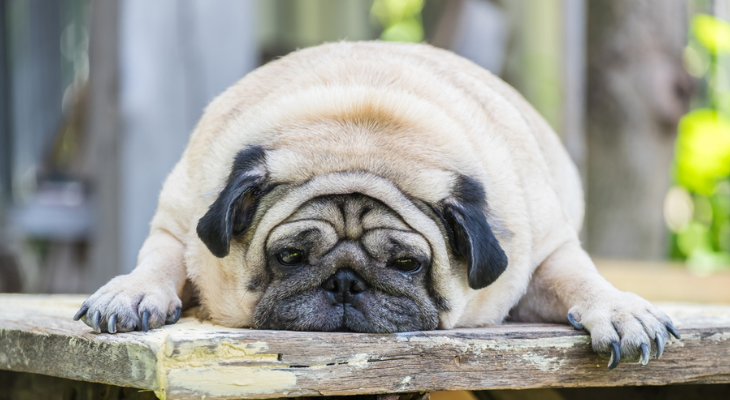
Signs Your Dog May Have Bloat
Every minute counts when your dog develops bloat. The condition affects dogs of any age and causes death just a few hours after symptoms start. Recognizing bloat symptoms and rushing your pet to the veterinarian can help your furry friend survive a bout of bloat.
How Does Bloat Happen?
Bloat occurs when excess air enters your dog's stomach, causing it to stretch. As the stomach expands, the openings at either end close, preventing the air from escaping. Increased pressure in the stomach stops blood flow to the abdomen and stomach. Blood circulates oxygen and nutrients throughout the body and is essential for good health. Without sufficient blood flow, organs and tissues may begin to die.
Sometimes the stomach not only expands, but also twists, preventing blood from reaching the intestines, spleen, pancreas and hind legs. According to the American Kennel Club (AKC), the pancreas may produce toxic hormones that stop the heart if it's deprived of oxygen.
What Are the Signs and Symptoms of Bloat?
Bloat can cause:
- Pain. Your pet may not want you to touch it's abdomen, may whine, or show other signs of pain.
- Difficulty Breathing. Your dog's air-filled stomach may press on its diaphragm, a muscle that helps it breathe. Pressure on the diaphragm can cause shallow or rapid breathing.
- Drooling. Excess drooling can be a sign of bloat.
- Panting. A dog in distress due to bloat may begin to pant.
- Dry Heaving. Your dog will attempt to vomit to relieve its discomfort, although nothing other than foam may come up.
- Enlarged Abdomen. Bloat can cause your pet's abdomen to look noticeably swollen, although your pet can still have bloat even if you don't see any changes in its appearance.
- Restless. Dogs may pace and become agitated and restless as symptoms worsen.
- Change in Posture. Is your dog dropping its chest toward the floor while raising its hind end? The unusual posture could be due to bloat.
- Other Signs. Dogs with bloat may have pale gums and a racing heartbeat.
If your pet has any of these symptoms, take it to the veterinarian immediately. Don't wait to see if its condition improves. Dogs that have these signs and symptoms can quickly go into shock and collapse without prompt treatment.
According to a research study published in the Journal of Veterinary Emergency and Critical Care, almost 36% of dogs don't survive bloat. The quicker your dog receives treatment, the better its chances of survival.
Why Do Dogs Develop Bloat?
Factors that could increase your pet's risk of bloat include:
- Eating Habits. Gulping food or water or eating or drinking large amounts of food or water increase the amount of air swallowed.
- Age. Older dogs are more likely to develop bloat than younger ones.
- Sex. Bloat occurs much more often in male dogs.
- Chest. Dogs with narrow, deep chests are at increased risk for bloat.
- Breed. Large breeds are prone to bloat. They include Great Danes, Doberman Pinschers, Standard Poodles, Gordon Setters, Weimaraners, St. Bernards and Irish Setters, according to the AKC.
- Exercise. Dogs that participate in vigorous activity immediately after eating are also more likely to develop bloat.
- Raised Bowls. Raising your pet's food and water bowls may make eating easier, but the practice could increase bloat risk for large breeds.
- Food Choices. Dogs that only eat dry food, eat only one meal per day, or eat food that is high in fat may be more likely to develop bloat.
How Is Bloat Treated?
Simple bloat (stomach bloating without twisting) can often be treated with intravenous (IV) fluids, pain medication and antibiotics. Treatment for simple bloat may also involve removing excess air by placing a tube or needle in the stomach to allow air to escape.
If your pet's stomach twists, surgery will be needed. During surgery, the veterinarian removes the excess air and moves the stomach back to its normal position. The stomach may also be stitched to the wall of abdomen to prevent the condition from happening again.
Quick treatment can save your dog's life should it develop bloat. Call us right away if your dog displays any of these signs and symptoms.
Sources:
American Kennel Club: Bloat (or GDV) in Dogs: What Is it and How Is it Treated?, 9/21/2021
https://www.akc.org/expert-advice/health/bloat-in-dogs/
PetMD: Bloat in Dogs, 11/26/2021
https://www.petmd.com/dog/conditions/digestive/signs-and-symptoms-bloat-dogs
Whole Dog Journal: Bloat in Dogs is Deadly, 5/23/2022
https://www.whole-dog-journal.com/health/bloat-in-dogs-is-deadly/
Wiley Online Library: Journal of Veterinary Emergency and Critical Care: The pattern of mortality in dogs with gastric dilatation and volvulus, 2/19/2020



